AFTER MIDNIGHT, DAWN.
THE state of the Continent defies the most far-seeing politician to guess at the upshot. Scarcely a single state shows anything like a determined or defined purpose ; but from Schleswig to Naples, the whole is movement without plan. You can almost as little define the boundaries or political essence of each state itself as its intent : you cannot say what is to bear the title of "Ger- many," almost as little what is "Austria," what "Naples," or even 'Italy." Armies, there are here and there, fighting for victory—and little else that is fixed or certain. The want of a clue to solve the gigantic European riddle appears to lie in the universal want of any great interest of a national or even of a factious kind. Classification is unsettled. Nations have so slight a nationality, that there is no single will, no desire, no purpose, which can be predicated of the whole. You-cannot define "Italy," its purpose or its desire ; but you may ascribe to that "geo- graphical expression" every variety of sentiment and political combination. " Germany " has no unity, even of design. Nor can national feeling be aroused with any success. The Italians falter in the war of independence ; the advocates of German unity are divided; France has a new fashion of policy every month.
This dispersion of interests arises in great part from the pro- gress of civilization. With more peaceful laws and manners, the great bond of union, instant and common danger, has lost its force, and men are more individualized. Such a state, however, cannot be a final one, because it is not a safe one. We see how the nations are distracted and paralyzed for want of a common pur- pose, insomuch that their relations are getting from bad to worse, and the ultimate solution of the trouble may perhaps be sug- gested by some common calamity. A Russian invasion for in- stance, would unite Germany. Until civilization, mud; further developed, has found out some higher and better form of common interest to concentrate the energies of peoples upon a common purpose, it must be sought in a common danger, a common ca- lamity. The worst then will but harbinger better times. Were they indeed able and earnest enough, the leading states- men of Europe might anticipate this inevitable calamity, and thus supersede the necessity of it. The talk of a congress of states has again revived ; and undoubtedly a congress might af- ford the legitimate opportunity. But disappointment has too often physicked expectation, to leave much hope that such an as- semblage will really gather itself until it is forced by the actual presence of calamity. A war there must be, or a congress ; and it would manifestly be best to bring the maturer councils of Eu- rope together, in order that they may compare notes, eliminate the possible from the impossible, and set Europe once more going, by a general sanction, under the new order. But the same de- fect of real care or zeal, which enervates the nations, also freezes their statesmen ; and we fear that there will be no congress until the one to settle the future peace—not one to prevent war. But calm follows the storm, as surely as there shall be sun after this dark March. The career of the world in its stayless orbit awaits not the will and fancy of statesmen.


























 Previous page
Previous page